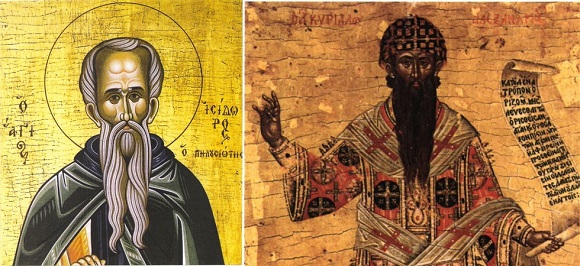Theology of Isidore of Pelusium & Cyril of Alexandria: A Review
10 January 2015The doctoral thesis submitted by Mrs Eirini Artemi to the University of Athens is a classical Patristic study. To conduct a classical research on the Fathers of the Church is simultaneously an easy and a difficult task. It is easy, because there is a huge number of similar studies, which have set a canon of research, which is easy to follow. At the same time, it is difficult, and this is for the same reason: any new study should contribute something, which has been left out of the scope of the previous studies. I think Mrs Artemi has navigated well through these difficulties. On the one hand, she follows the classical patterns of patristic studies. On the other hand, she has provided a fresh outlook at the well known topics.
The very idea to conduct a comparative study of St Cyril of Alexandria and St Isidore of Pelusium is fresh. Even though these authors lived in the same period, they belonged to different contexts and followed different lines of thought. Mrs Artemi explores these differences, even though putting more stress on the difference of the contexts, in which the two Saints lived, would help her in her comparative study. I appreciated the author’s emphasis on the Trinitarian and Pneumatological aspects of the two theologians. At the same time, she does not ignore Christological topics. Particularly interesting is her analysis of the notions of enhypostaton – a much debated and often misleading concept in the modern scholarship. Another important scholarly input of Mrs Artemi to the studies is her excellent linguistic analysis of St Cyril’s and St Isidore’s work. The other great value of the work lies in the analysis of the Biblical traditions behind the work of the two Fathers. This is a helpful and fruitful approach, which the author masters with great skill.
Speaking about shortcomings of the work, I think, Mrs Artemi’s criticism of St Cyril seems to be anachronistic. She asserts that his thought and language were not clear and rather confusing. This is an uncritical repeating of some earlier works on Cyril, which do not stand a proper historical analysis. The role of Cyril in the Orthodox theology was pivotal – no Father ever doubted his authority and no one ever complained about clarity of his thought. Anyone who would do so would have been condemned as not quite Orthodox. A demand for clear Christological formulas emerged later on, in the 6th century, when interpreters of Cyril confused his thought. The two schools of interpretation of Cyril: one literal and the other creative, disagreed on the formulations of Chalcedon. The author does not make sufficient distinction between the former (Severans) and Eutychians – she sells them in wholesale as ‘Monophysites’. A more clear distinction between the Severans and Monothelites would help as well.
In sum, the study of Mrs Artemi brings forward our knowledge about the times and theology of the period, which was dominated by the figure of St Cyril. It sheds additional light on the figures that remain in the shadow of the great Father, such as St Isidore. This is an important contribution to reconstruction of the whole picture of the epoch, which became formative for the Orthodox theology.
Review of the thesis by Eirini Artemi, The Triune God on the teaching of Isidore of Pelusium and the relationship to the teaching of Cyril of Alexandria







